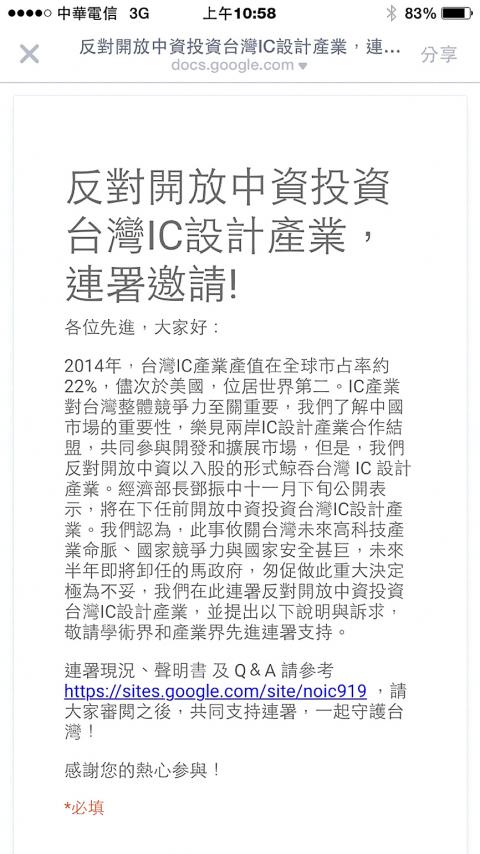A petition initiated by academics opposing Chinese capital being invested in Taiwan’s integrated circuit (IC) design industry had garnered 143 signatures in two days as of yesterday, following the announcement on Friday that China’s Tsinghua Unigroup Ltd (清華紫光) is to buy a 25 percent stake in Siliconware Precision Industries Co Ltd (矽品精密) — the world’s third-largest chip packager and tester — and in its subsidiary ChipMOS Technologies Inc (南茂).
The campaign was launched by an alliance formed by National Chiao Tung University professor Lin Ying-dar (林盈達), National Taiwan University professor Lin Tsung-nan (林宗男) and National Cheng Kung University professor Li Jung-shian (李忠憲), which opposes the inclusion of the information and communications industry in a proposed cross-strait service trade agreement.
The petition says that Chinese investment in the IC design industry has huge implications for the survival of Taiwanese firms, as well as national security.

Screenshot by Liu Wan-chun, Taipei Times
It is inappropriate for President Ma Ying-jeou’s (馬英九) administration to negotiate such a significant policy when its term is to end in six months, the petition says.
Minister of Economic Affairs John Deng (鄧振中) last month said the ministry is drafting new regulations before his term ends in May to lift a ban on Chinese capital entering the IC sector.
The Ma administration should play its part as a caretaker Cabinet and leave such matters to the next administration, which should evaluate possible deregulation professionally and democratically, the petition says.
The alliance said that Chinese investors could control the management and development of a Taiwanese IC design company if they were to hold a 10 percent or 15 percent stake in it, as most IC design companies in Taiwan have a high degree of stock dispersion.
China’s IC design industry could not compete across the Strait without the support of Taiwanese companies, but the industry here could lose ownership and management to pressure from the Chinese market and Beijing once Chinese capital is allowed to enter Taiwan, the alliance said.
This would bring negative effects for engineers and stockholders, it added.
The alliance is to hold a press conference in Taipei today to urge the government to re-evaluate deregulation of Chinese capital.
It wants to raise public awareness of the potential effects of deregulation, it said.
Chinese Nationalist Party (KMT) presidential candidate Eric Chu (朱立倫) said he opposes Chinese investment in Taiwanese microchip designers, describing the US$19 billion industry as too important to open to greater influence from the Chinese Communist Party.
Chu made the remarks in response to questions about a proposal by Ma’s government to lift a ban on Chinese investment in companies such as Hsinchu-based MediaTek Inc (聯發科) as the global smartphone boom slows.
“We can cooperate, but that one’s still very sensitive to our economy,” Chu said in an interview on Friday at KMT headquarters in Taipei.
If elected president, Chu said he “would not allow that one, because it is not yet the time.”
Additional reporting by Bloomberg

NATIONAL SECURITY THREAT: An official said that Guan Guan’s comments had gone beyond the threshold of free speech, as she advocated for the destruction of the ROC China-born media influencer Guan Guan’s (關關) residency permit has been revoked for repeatedly posting pro-China content that threatens national security, the National Immigration Agency said yesterday. Guan Guan has said many controversial things in her videos posted to Douyin (抖音), including “the red flag will soon be painted all over Taiwan” and “Taiwan is an inseparable part of China,” while expressing hope for expedited “reunification.” The agency received multiple reports alleging that Guan Guan had advocated for armed reunification last year. After investigating, the agency last month issued a notice requiring her to appear and account for her actions. Guan Guan appeared as required,

A strong cold air mass is expected to arrive tonight, bringing a change in weather and a drop in temperature, the Central Weather Administration (CWA) said. The coldest time would be early on Thursday morning, with temperatures in some areas dipping as low as 8°C, it said. Daytime highs yesterday were 22°C to 24°C in northern and eastern Taiwan, and about 25°C to 28°C in the central and southern regions, it said. However, nighttime lows would dip to about 15°C to 16°C in central and northern Taiwan as well as the northeast, and 17°C to 19°C elsewhere, it said. Tropical Storm Nokaen, currently

‘NATO-PLUS’: ‘Our strategic partners in the Indo-Pacific are facing increasing aggression by the Chinese Communist Party,’ US Representative Rob Wittman said The US House of Representatives on Monday released its version of the Consolidated Appropriations Act, which includes US$1.15 billion to support security cooperation with Taiwan. The omnibus act, covering US$1.2 trillion of spending, allocates US$1 billion for the Taiwan Security Cooperation Initiative, as well as US$150 million for the replacement of defense articles and reimbursement of defense services provided to Taiwan. The fund allocations were based on the US National Defense Authorization Act for fiscal 2026 that was passed by the US Congress last month and authorized up to US$1 billion to the US Defense Security Cooperation Agency in support of the

PAPERS, PLEASE: The gang exploited the high value of the passports, selling them at inflated prices to Chinese buyers, who would treat them as ‘invisibility cloaks’ The Yilan District Court has handed four members of a syndicate prison terms ranging from one year and two months to two years and two months for their involvement in a scheme to purchase Taiwanese passports and resell them abroad at a massive markup. A Chinese human smuggling syndicate purchased Taiwanese passports through local criminal networks, exploiting the passports’ visa-free travel privileges to turn a profit of more than 20 times the original price, the court said. Such criminal organizations enable people to impersonate Taiwanese when entering and exiting Taiwan and other countries, undermining social order and the credibility of the nation’s